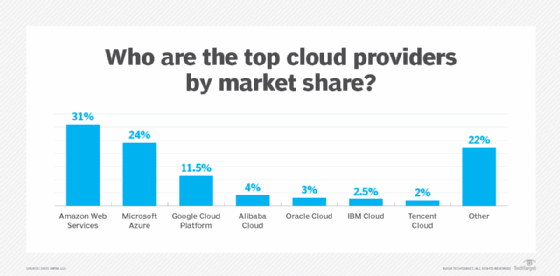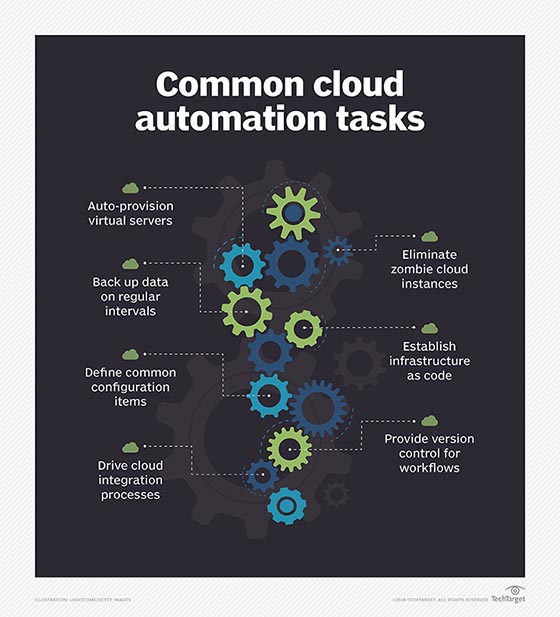Top 25 cloud computing skills to boost your career in 2025
As cloud adoption increases, so too does the need for IT experts with cloud computing skills. Explore these 25 key skills to help you on your journey.
While larger businesses' move to the cloud had already begun to erode investment in on-premises data centers and servers, the COVID-19 pandemic was the tipping point for companies of all sizes to enable and support more remote, distributed workforces. This called for the deployment of cloud-enabled video conferencing tools, including Zoom and Microsoft Teams, and a spike in demand for employee productivity and collaboration products, such as Google Docs.
Forward-thinking companies, facing macroeconomic headwinds of higher inflation and interest rates, have recognized the need for organizational efficiency with the cloud.
What is cloud computing?
Cloud computing lets people access software applications, data storage and other services over the internet instead of through traditional physical servers in a back office.
The cloud computing model charges internet-based computing services users for what they consume on a pay-per-use basis. This is often called a consumption-based pricing model and is a departure from more traditional subscription-based pricing models.
The three main types of cloud services are:
- Software as a service. SaaS refers to on-demand hosted services that provide access to business applications.
- Platform as a service. PaaS refers to web-based services and the deployment of applications in the cloud.
- Infrastructure as a service. IaaS refers to virtualized computing resources over the internet and often offers storage.
Cloud services attract many businesses because they don't need to buy and maintain physical technology products, software, storage and infrastructure.
A handful of large, public cloud service providers (CSPs) and their products currently dominate the cloud computing world. These CSPs include AWS, Google Cloud Platform (GCP) and Microsoft Azure. These vendors can deliver the same service to hundreds of thousands -- or even millions -- of customers across different industries at an attractive price point.

Cloud computing jobs beckon
Cloud computing, firmly entrenched in all aspects of business and home life, is here to stay. An increasing number of companies seek qualified and experienced cloud experts across several domains, including engineering, database management, programming, development, security and analytics. LinkedIn rates cloud computing as among the most sought-after tech skills, after AI and machine learning (ML). This presents an opportunity for those willing to rise to the challenge of mastering basic and more advanced cloud computing skills.
Here are the top cloud computing skills -- a dozen basic abilities and 13 of the more cutting-edge qualifications -- to obtain in 2025.
Key general cloud computing skills
1. Cloud service platform expertise
Gaining a thorough understanding of the CSP marketplace is a good starting point. Familiarize yourself with the three big public cloud computing platforms -- AWS, Microsoft Azure and GCP. Other companies with cloud platforms include Akamai, IBM, Oracle Cloud Infrastructure (OCI), DigitalOcean and Alibaba Cloud. Organizations and CSPs alike also use several widely deployed open source technology platforms, including OpenStack and Apache CloudStack, to build public and private cloud services. It's essential to recognize which provider offers the best option for hosting different applications or running various workloads, including the pros and cons of each provider. Each leading cloud platform has its strengths, and each CSP also has its cost structure.
2. Programming languages
Building applications in the cloud often requires knowledge of mainstream programming languages and the ability to write code to build, deploy and manage applications. The most common programming languages include Java, JavaScript and Python, which are well-suited for cloud-based software. Developing database-powered applications requires familiarity with SQL and data structure concepts, including data schemas.
3. Application programming interfaces
APIs are widely used in modern software development, both on-premises and in the cloud. APIs enable different services and applications to interact for data exchange. Building, linking and integrating different workloads in the cloud often requires using APIs. As a cloud professional, you must be adept at coding these APIs and the links that integrate workloads into the cloud. The most common types of APIs used in the cloud are REST and GraphQL.
4. Database management
The database is one of the most universal application services in the cloud today. Cloud databases offer organizations the advantage of readily available managed offerings with a high degree of scalability. All major cloud providers have multiple types of database services, including relational database, NoSQL, graph database and data warehouse offerings. Understanding the different database types, how they work and what they enable is a critical skill set for aspiring cloud professionals.
5. Network management
Knowledge of networking basics, including establishing connections across resources and locations, is an essential skill in the cloud. Cloud resources are often connected to on-premises locations, allowing an organization to establish services such as a virtual private cloud and secure connectivity. The cloud also requires an organization to access its cloud resources effectively, which necessitates some network management. Networking skills are also needed to connect across resources or, as in multi-cloud deployments, across clouds.
6. Development and operations
In modern cloud environments, developers and operations support personnel no longer work in silos. DevOps is the practice of harmonizing and integrating development and operations activities throughout the entire software development and application service lifecycle, from design to development to production support. This approach significantly reduces time to market for applications and eliminates unnecessary bottlenecks. DevOps workflows also commonly involve continuous integration/continuous deployment (CI/CD) services in the cloud, as well as observability and monitoring for operations.
7. Machine learning and AI
Any aspiring cloud computing professional should gain a firm grasp of the fundamentals of ML and AI, which are among today's most sought-after technology skills. In 2023, organizations saw the dramatic rise of generative AI. All major public cloud platforms offer GenAI services that let organizations build, manage and deploy large language models and related services.
8. Cloud security
In cloud computing environments, as with any other IT environment, security is an essential function. Cloud security is a complex topic that demands skills across several domains. Identity and access management is a vital cloud service, so the tools to manage and configure it are valuable. Securing personally identifiable information stored in the cloud is also essential. Naturally, that highlights the critical ability to understand, configure, deploy and manage cloud-native application platform technologies. The loss or breach of personal customer data or proprietary company intellectual property can devastate the reputation and finances of a business. Today, the demand for cybersecurity talent far outpaces supply, and the ongoing rise in cloud computing technologies means that trend continues.
9. Hybrid cloud
While the public cloud has many benefits, it's not necessarily suitable for every part of a business's IT infrastructure, applications and workloads. For this reason, the hybrid cloud approach has gained popularity. In a hybrid cloud model, certain elements are retained on-premises or in a dedicated private cloud, while less sensitive or more modern applications are migrated to a public cloud. It's a valuable skill to be able to determine which elements belong where. Cloud professionals must understand how each cloud model works and how to unify them -- often combining public and private resources and requirements -- into an agreeable hybrid arrangement.
10. Storage
Data lies at the heart of cloud computing, so it's necessary to understand how and where to store it. Depending on a business's needs and the type and volume of its data, it might select one or more of the following types of storage: personal cloud, public cloud, private cloud and hybrid cloud. Cloud storage benefits include accessibility, reliability, fast deployment, data backup and recovery, and lower cost. An in-depth understanding of how each type of cloud storage works is invaluable for cloud computing professionals. Increasingly large cloud storage volumes are used as a data lake or a data lakehouse. With both, it's crucial to have the skills to understand the proper formats, configuration and deployment that allow the most effective use of the data for operations, analytics and AI use cases.
11. Containers
Containers provide a packaging mechanism that isolates applications from the environments in which they are running. This decoupling process lets businesses deploy container-based applications swiftly and consistently. Knowledge of today's most popular container technologies, such as Docker and Kubernetes, increases your likelihood of securing employment in a cloud computing role. Every major cloud platform now has some form of container or Kubernetes service to help organizations manage deployments, and cloud professionals must understand how they work.
12. Data and application migration and deployment
Moving software applications from a data center into a cloud environment is more complex than copying files from one server to another. Applications running on-premises often include software and hardware dependencies that don't always directly translate into the cloud, as in a lift-and-shift approach. Because the cloud is a different environment, a thorough assessment is needed before any cloud migration occurs. The best cloud professionals treat each application on its merits and are prepared to work with business stakeholders to chart the best course forward.
Key advanced cloud computing skills
13. Automation
Automation is one of the most significant benefits of cloud services. Applications programmed to make their own, correct decisions -- without human intervention -- increase efficiency. Of course, cloud professionals have a role to play in facilitating this kind of automation. Specifically, they need to be well-versed in the mechanics of a business's cloud architecture and the different components that interact with or depend on one another. One of the most common forms of automation in the cloud is autoscaling, which helps applications and services scale up or down based on demand. Being able to implement autoscaling configuring policies properly is a vital cloud skill.

14. Cloud orchestration
Many cloud deployments rely on multiple services working together, but sometimes the project's large scale precludes a manual solution. This is where cloud orchestration technology fits in. Cloud orchestration involves the automation and coordination of multiple tasks instead of just one, making it another top cloud skill.
15. Linux
With rare exceptions, many cloud services, including those running on Microsoft Azure, benefit from using the open source Linux OS. Linux is used for containers and VM instances across the cloud, as it provides a low- or even no-cost OS for applications and services. Linux offers features such as easy customization and security. The demand for cloud professionals who can design, build, deploy, maintain and administer Linux-based servers is growing.
16. Performance testing, metrics and analytics
Testing the performance of cloud environments lets you gauge how effectively they're operating. It also uncovers areas for potential iterative improvement. A key element of testing is having the right metrics and analytics to understand how a given cloud service or application performs. Expertise in metrics and analytics -- and understanding which metrics should be applied to specific cloud services -- lets you demonstrate the ROI of a business's cloud technology.
17. Cost and workload management
Determining and monitoring costs and workload estimations are valued skills. For instance, if you pinpoint where certain set data limits are exceeded, you can help a business avoid unforeseen costs. This skill also enables you to identify and eliminate unused features. The ability to manage cloud costs today is often the domain of the discipline known as FinOps.
18. Flex capacity
As opposed to on-premises environments where hardware is fixed and services can be more static, cloud environments are extremely fluid. Indeed, the best cloud computing experts are comfortable functioning in an atmosphere continually in flux and stay on top of constant changes to the underlying infrastructure, including databases, servers and network connections.
19. Cloud partnering
With the myriad of services and complexity inherent in a large cloud project, it isn't uncommon for businesses to engage external consultants and contractors to benefit from their specialized skills. These cloud partners can bring invaluable experience and new insights into a project team. Prospective employers seek candidates who are at ease with these kinds of arrangements.
20. Serverless
Serverless computing capabilities that enable event-driven computing, also sometimes referred to as functions as a service, is an increasingly important cloud skill. Serverless gives organizations tight control over costs because a serverless function only runs when triggered, instead of being on all the time like a container or VM image.
21. Infrastructure as code
For the deployment and management of cloud resources, few skills are as critical now as understanding infrastructure as code. With IaC, cloud engineers programmatically define the cloud resources and the configuration for the desired state for a specific cloud service deployment. Among the most commonly used IaC tools is HashiCorp Terraform, which has its own configuration language known as HashiCorp Configuration Language (HCL).
22. Multi-cloud
Gone are the days when using a single cloud provider was considered an IT best practice. In 2025 and beyond, many organizations are moving to a multi-cloud approach that limits the risk of vendor lock-in to one specific provider. Multi-cloud also provides resilience, enabling organizations to deploy in more locations. It's incumbent upon cloud professionals to learn how best to design, arrange and manage multi-cloud deployments for operational resilience, availability and cost control.
23. Analytics
Analytics and data visualization represent important skill sets for big data implementations in the cloud. Having the right skills to transform and process data sets helps in the creation of streaming pipelines for real-time analytics and in choosing the most appropriate use cases. The ability to deploy real-time streaming capabilities using technologies such as Apache Kafka is critical not just for analytics, but in support of cloud business operations and AI.
24. Platform engineering
Organizations increasingly turn to platform engineering to help build and maintain cloud services and applications. To be clear, platform engineering is not the same as DevOps. A strong understanding of platform engineering and familiarity with its underlying tools and practices are valuable cloud skills for 2025 and beyond.
25. Edge computing and IoT integration
Edge computing and IoT integration are becoming crucial skills for cloud professionals as organizations seek to process data closer to the source. With the rise of 5G connectivity, edge computing is becoming increasingly widespread, allowing more devices on the edge to connect. Edge computing also helps enable hybrid cloud architecture deployments. All the major cloud providers have some form of edge computing services in 2025, with many relying on Kubernetes as a primary technology.
How to learn these key cloud computing skills?
There is no shortage of available learning resources to help you build and continually augment your cloud computing skills. These include formal training at colleges, as well as free and paid online resources. Many businesses also offer on-the-job training opportunities.
Every major cloud provider has its own set of certifications, and there are a wide range of globally recognized third-party certifications, including the following:
- AWS. AWS has numerous training and certification programs, including programs for cloud architectures, operations and developers. The entry-level certification is the AWS Certified Cloud Practitioner.
- CompTIA. CompTIA offers a series of broad IT certification programs and has a generalist cloud designation known as CompTIA Cloud Essentials+, which provides a vendor-neutral approach.
- GCP. Google Cloud's certification programs include foundational, associate and professional levels. The foundational path's entry-level certification is Cloud Digital Leader.
- IBM. IBM has a series of training and role-based certifications for the cloud, including associate, professional and advanced levels. At the entry level is the IBM Cloud Advocate certification.
- (ISC)2. For those who want a security-related cloud designation, (ISC)2 provides the Certified Cloud Security Professional certification.
- Microsoft Azure. Microsoft's cloud certification offerings are intermingled with its overall certification programs that span every product in the company's portfolio. The entry-level cloud certification is Microsoft Certified: Azure Fundamentals.
As the adoption and popularity of cloud services become entrenched in every facet of life, a world of opportunity awaits aspiring cloud computing professionals.
Editor's note: This unranked list is based on extensive web research and includes high-ranked certifications in Google trends. The article was updated in November 2024 to improve the reader experience.
Sean Michael Kerner is an IT consultant, technology enthusiast and tinkerer. He has pulled Token Ring, configured NetWare and has been known to compile his own Linux kernel. He consults with industry and media organizations on technology issues.
Elizabeth Davies contributed to this article.







